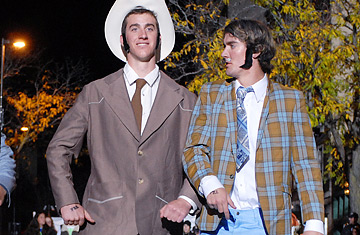
Students celebrate Halloween in Madison, Wisconsin
Halloween isn't what it used to be on State Street in Madison, Wisconsin. Last Sunday, the main gathering point for the university town's annual Halloween bash saw a throng of heavily boozed cross-dressers, walking food products and pop-culture oddities slowly crawling about at almost 1:30 Sunday morning, closing time here. But Molly Kelley, a junior at the University of Wisconsin-Madison, pointed at the large unpopulated gaps of littered concrete from a balcony overlooking the seven-block stretch. "Two years ago this place was packed like sardines," she says. "You couldn't move. Either you got run over by [police] horses or climbed on light poles."
Halloween rioting plagued the ritual from 2002 to 2005, replete with tear gas–saturated finales. City officials last year finally decided to fence off State Street and charge admission fees, limiting attendance to 80,000. This year, Madison is tapping into corporate America in the hopes of turning a civic black eye into something its Visitors and Conventions Bureau can boast about.
Over the weekend, corporate sponsorship tents lined the blocks, and their logos were as ubiquitous as the plodding police horses. Mountain Dew set up an "Amp Lounge," where samples of its energy drink were passed out freely. City officials handed over much of the planning to Frank Productions, a large Midwest concert promoter that brought in, as the main act, the alt-rock band Lifehouse — whose music isn't exactly conducive to rioting. While passing out beaded necklaces in the lounge Saturday, Gary Wyspiszynski, a key account manager for Mountain Dew, says "It was either going to go this way or it was going to be forgotten."
The Halloween gathering was once a spontaneous event, taking place on a public street and without an official organizational authority. But when things went wrong, it was the city and the university that got the blame. With less than one cop for every 10 people, little could be done besides resorting to tear gas to disperse the crowd of debauched revelers.
Neither Fred Frank, president of Frank Productions, nor city officials would comment on just how much the city has paid to tame the event — officials said audit reports would take weeks to finalize. But taxpayers from Madison to Green Bay have been footing much of the costs for the police and cleanup over the past tumultuous years. George Twigg, a public information officer for Madison's mayor, says the city expects to get at least $200,000 in ticket sales, which he says will help ease the financial burden. Tickets cost $5 if purchased early and $7 for those who bought them on Saturday.
"The alternative is we bring in the laissez-faire Halloween celebration of the past, which is unacceptable," Twigg says. Dave Maynard, vice president of Frank Productions agrees. "How do we reduce the debt to taxpayers? Just giving people something to do is a big part of it." Not that the event didn't have its share of rowdiness this year, with 126 arrests. But that is a big drop from the 334 in 2005.
Still, some young traditionalists are conflicted. Elise Volkmann, a junior at the University of Wisconsin-Madison, says slapping corporate labels on what used to be a free-for-all bothered her. "It didn't seem like it was right because it wasn't in the Madison, State Street, Halloween tradition to have it corporately sponsored," she says. "In the past, Halloween has been about students getting together and having fun, and we don't need Mountain Dew coming and bringing in bands." At the same time, being a State Street resident, Volkmann appreciates the new controls on the event. "I didn't have tear gas coming in my window, and I liked that."
